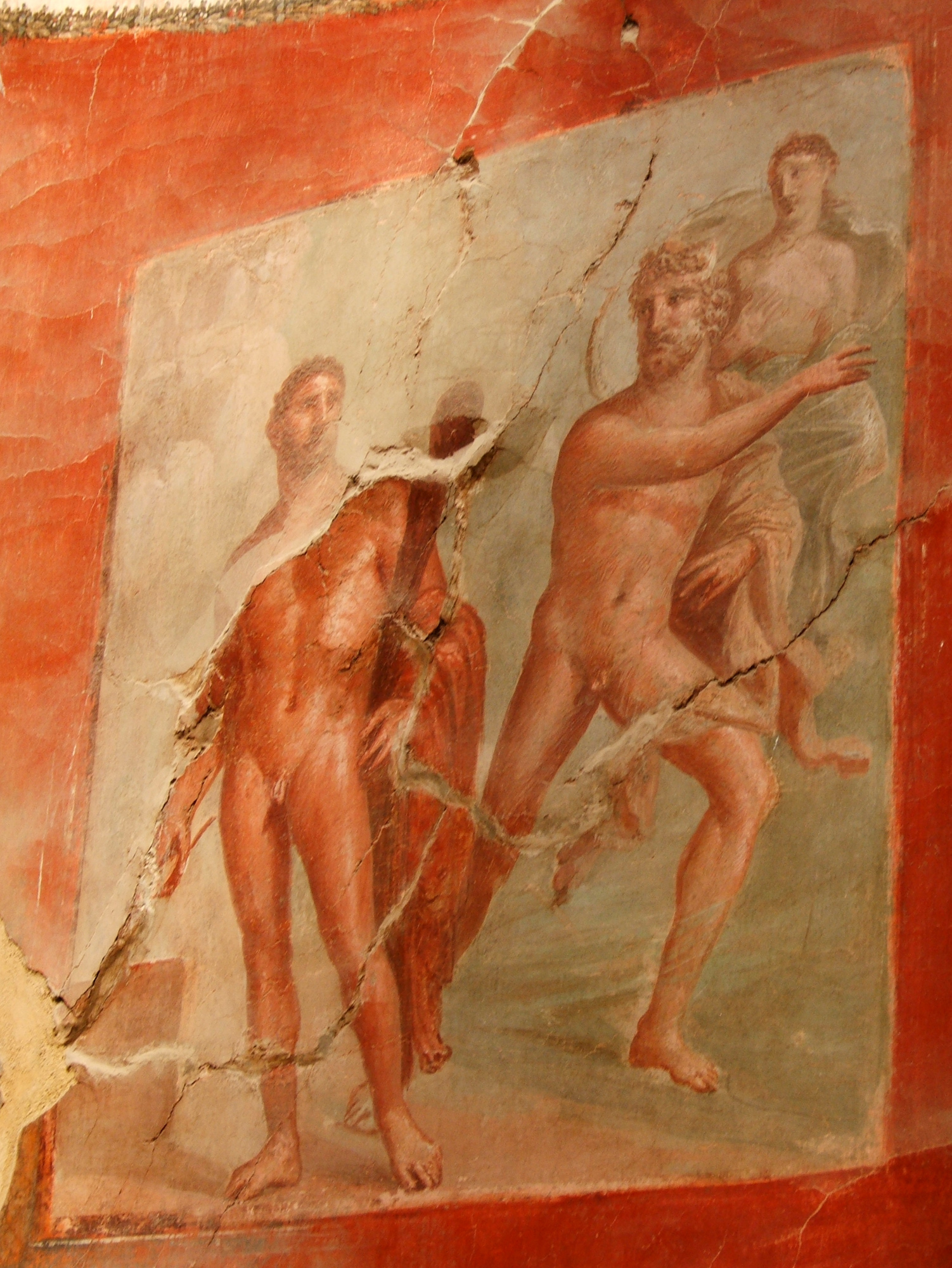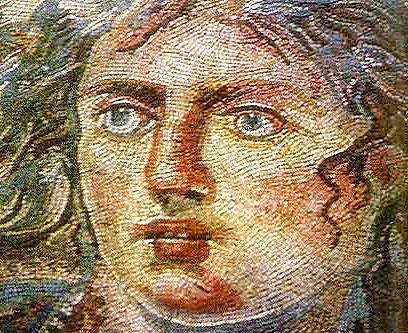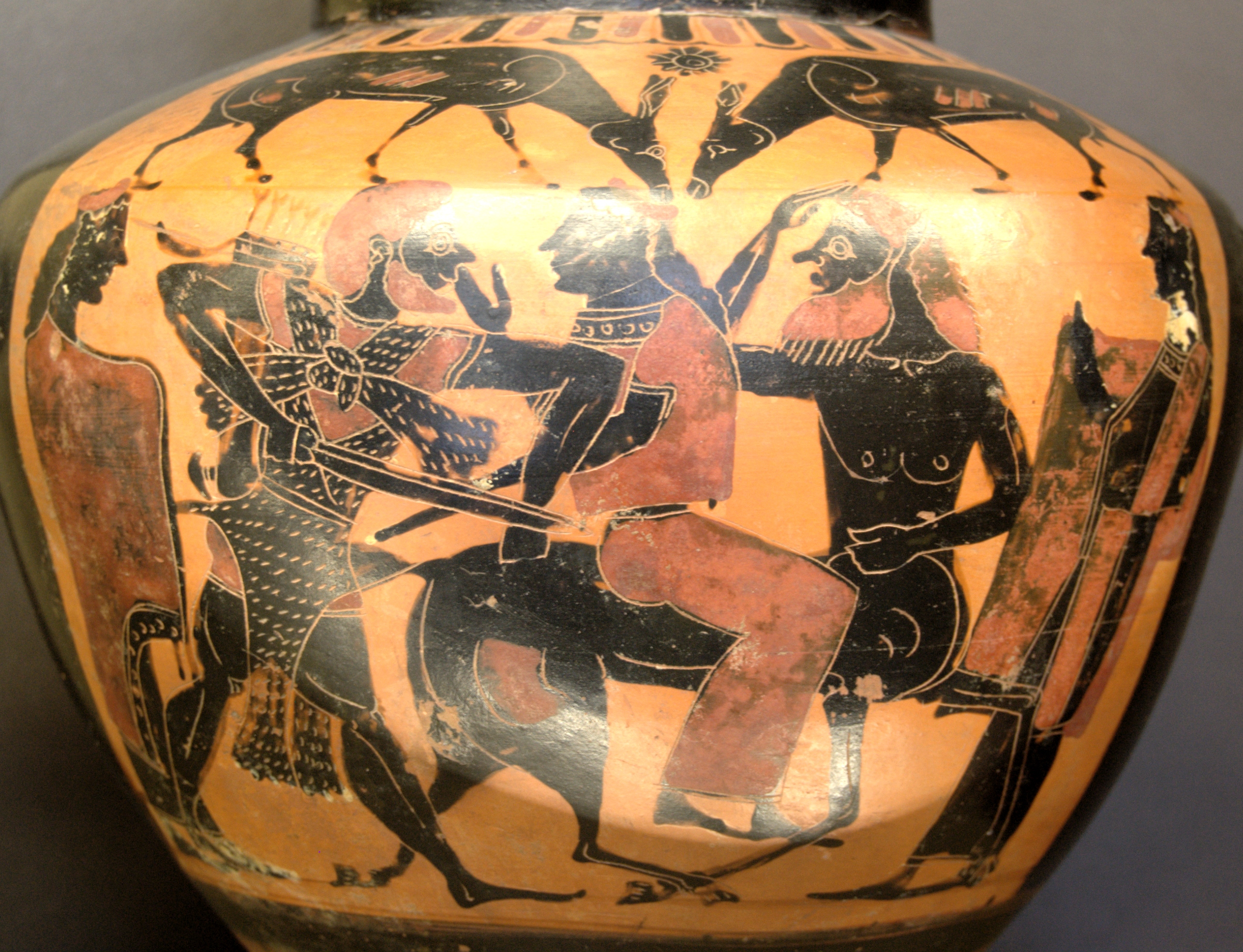|
Achelous
In ancient Greek religion and Greek mythology, mythology, Achelous (also Acheloos or Acheloios) (; Ancient Greek: Ἀχελώϊος, and later , ''Akhelôios'') was the god associated with the Achelous River, the largest river in Greece. According to Hesiod, he was the son of the Titans Oceanus and Tethys (mythology), Tethys. He was also said to be the father of the Siren (mythology), Sirens, several nymphs, and other offspring. Achelous was able to change his shape, and in the form of a bull, he wrestled Heracles for the right to marry Deianeira, but lost. He was also involved in the legend of the Argos, Peloponnese, Argive hero Alcmaeon (mythology), Alcmaeon. Etymology The name Ἀχελώϊος is possibly pre-Greek, its meaning is not entirely certain. Recent arguments suggest it is Semitic languages, Semitic in origin, with the initial Αχ- stemming from the Akkadian (language), Akkadian ''aḫu'' ("bank of the river"), or ''aḫû'' ("seashore") and the suffix -ελώἴ� ... [...More Info...] [...Related Items...] OR: [Wikipedia] [Google] [Baidu] |
Achelous River
The Achelous (, ''Akhelôios''), also Acheloos, is a river in Epirus, western Greece. It is long. It formed the boundary between Acarnania and Aetolia of antiquity. It empties into the Ionian Sea. In ancient times its spirit was venerated as the river god Achelous. Herodotus, taking notice of the shoreline-transforming power of the Acheloos River, even compared it to the Nile in this respect: :'There are other rivers as well which, though not as large as the Nile, have had substantial results. In particular (although I could name others), there is the Achelous, which flows through Acarnania into the sea and has already turned half the Echinades islands into mainland.' (2.10, trans. Waterfield) It is said to have been called more anciently ''Thoas'', ''Axenus'' and ''Thestius''. Course The river Achelous begins at about elevation on the eastern slope of Lakmos mountain in the Pindus range, near the village Anthousa in the westernmost part of the Trikala regional unit. O ... [...More Info...] [...Related Items...] OR: [Wikipedia] [Google] [Baidu] |
Siren (mythology)
In Greek mythology, sirens () are female humanlike beings with alluring voices; they appear in a scene in the ''Odyssey'' in which Odysseus saves his crew's lives. Roman poets place them on some small islands called Sirenum scopuli. In some later, rationalized traditions, the literal geography of the "flowery" island of Anthemoessa, or Anthemusa, is fixed: sometimes on Cape Pelorum and at others in the islands known as the Sirenuse, near Paestum, or in Capreae. All such locations were surrounded by cliffs and rocks. Sirens continued to be used as a symbol of the dangerous temptation embodied by women regularly throughout Christian art of the medieval era. "Siren" can also be used as a slang term for a woman considered both very attractive and dangerous. Nomenclature The etymology of the name is contested. Robert S. P. Beekes has suggested a Pre-Greek origin. Others connect the name to σειρά (''seirá'', "rope, cord") and εἴρω (''eírō'', "to tie, join, faste ... [...More Info...] [...Related Items...] OR: [Wikipedia] [Google] [Baidu] |
River Gods (Greek Mythology)
In ancient Greek religion and mythology, rivers () were often personified as deities, and in a number of ancient Greek cities river gods were the subject of local worship. In Hesiod's ''Theogony'', the river gods are the offspring of the Titans Oceanus and Tethys, and the brothers of the Oceanids. In Greek mythology, river deities – such as Inachus, Scamander, and Peneus – are often progenitors of local genealogical lines. In the ''Iliad'', there are references to sacrifices being made to river deities, including the sacrifice of ephebes' hair. During military campaigns into foreign territory, there is evidence of sacrifices having been made to rivers upon their crossing. River deities could also be invoked as witnesses to an oath. Depictions of river deities in ancient Greek art often combine anthropomorphic features with bull-like elements such as horns. Mythology The river gods were the 3000 sons of the great earth-encircling river Oceanus and his wife Tethy ... [...More Info...] [...Related Items...] OR: [Wikipedia] [Google] [Baidu] |
Alcmaeon (mythology)
In Greek mythology, Alcmaeon (; Ancient Greek: Ἀλκμαίων ''Alkmaíōn''), as one of the Epigoni, was the leader of the Argives who attacked Thebes, taking the city in retaliation for the deaths of their fathers, the Seven against Thebes, who died while attempting the same thing. Family Alcmaeon was the son of Amphiaraus and Eriphyle and brother of Amphilochus. He had many progeny by different women including Clytius by Alphesiboea or Arsinoe, daughter of Phegeus; Amphoterus and Acarnan by Callirhoe, daughter of Achelous and lastly Amphilochus and Tisiphone by Manto, daughter of Tiresias. His son Clytius founded the Klytidiai, a clan of seers in Elis who interpreted the oracles of the Temple of Zeus at Olympia. Mythology The second Theban war Pindar's eighth Pythian ode relates a prophecy by Amphiaraus that the Epigoni will conquer Thebes, and that Alcmaeon will be the first through the gates. The mythographer Apollodorus, also states that the other ... [...More Info...] [...Related Items...] OR: [Wikipedia] [Google] [Baidu] |
Heracles
Heracles ( ; ), born Alcaeus (, ''Alkaios'') or Alcides (, ''Alkeidēs''), was a Divinity, divine hero in Greek mythology, the son of ZeusApollodorus1.9.16/ref> and Alcmene, and the foster son of Amphitryon.By his adoptive descent through Amphitryon, Heracles receives the epithet Alcides, as "of the line of Alcaeus (mythology), Alcaeus", father of Amphitryon. Amphitryon's own, mortal son was Iphicles. He was a descendant and half-brother (as they are both sired by the god Zeus) of Perseus. He was the greatest of the Greek heroes, the ancestor of royal clans who claimed to be Heracleidae (), and a champion of the Twelve Olympians, Olympian order against chthonic monsters. In Roman mythology, Rome and the modernity, modern western world, West, he is known as Hercules, with whom the later Roman emperors, in particular Commodus and Maximian, often identified themselves. Details of his cult (religion), cult were adapted to Rome as well. Origin Many popular stories were told ... [...More Info...] [...Related Items...] OR: [Wikipedia] [Google] [Baidu] |
Oceanus
In Greek mythology, Oceanus ( ; , also , , or ) was a Titans, Titan son of Uranus (mythology), Uranus and Gaia, the husband of his sister the Titan Tethys (mythology), Tethys, and the father of the River gods (Greek mythology), river gods and the Oceanids, as well as being the great river which encircled the entire world. Etymology According to M. L. West, the etymology of Oceanus is "obscure" and "cannot be explained from Greek". The use by Pherecydes of Syros of the form () for the name lends support for the name being a loanword. However, according to West, no "very convincing" foreign models have been found. A Semitic derivation has been suggested by several scholars, while R. S. P. Beekes has suggested a loanword from the Aegean Pre-Greek non-Indo-European Stratum (linguistics), substrate. Nevertheless, Michael Janda sees possible Indo-European connections. Genealogy Oceanus was the eldest of the Titan offspring of Uranus (Sky) and Gaia (Earth). Hesiod lists his T ... [...More Info...] [...Related Items...] OR: [Wikipedia] [Google] [Baidu] |
Tethys (mythology)
In Greek mythology, Tethys (; ) was a Titans, Titan daughter of Uranus (mythology), Uranus and Gaia (mythology), Gaia, a sister and wife of the Titan Oceanus, and the mother of the River gods (Greek mythology), river gods and the Oceanids. Although Tethys had no active role in Greek mythology and no established cults, she was depicted in mosaics decorating baths, pools, and triclinium, triclinia in the Greek East, particularly in Antioch and its suburbs, either alone or with Oceanus. Genealogy Tethys was one of the Titan offspring of Uranus (Sky) and Gaia (Earth). Hesiod lists her Titan siblings as Oceanus, Coeus, Crius, Hyperion (mythology), Hyperion, Iapetus (mythology), Iapetus, Theia, Rhea (mythology), Rhea, Themis, Mnemosyne, Phoebe (Titaness), Phoebe, and Cronus. Tethys married her brother Oceanus, an enormous river encircling the world, and was by him the mother of numerous sons (the River gods (Greek mythology), river gods) and numerous daughters (the Oceanids). Accordi ... [...More Info...] [...Related Items...] OR: [Wikipedia] [Google] [Baidu] |
Deianeira
Deianira, Deïanira, or Deianeira ( ; , or , ), also known as Dejanira, is a Calydonian princess in Greek mythology whose name translates as "man-destroyer" or "destroyer of her husband". She was the wife of Heracles and, in late Classical accounts, his unwitting murderer, killing him with the poisoned Shirt of Nessus. She is the main character in Sophocles' play '' Women of Trachis''. Family Deianira was the daughter of Althaea and her husband Oeneus (whose name means "wine-man"), the king of Calydon (after the wine-god gave the king the vine to cultivate), and the sister of Meleager. Her other siblings were Toxeus, Clymenus, Periphas, Agelaus (or Ageleus), Thyreus (or Phereus or Pheres), Gorge, Eurymede and Melanippe. In some accounts, Deianira was the daughter of King Dexamenus of Olenus and thus, sister to Eurypylus, Theronice and Theraephone. Others called this daughter of Dexamenus as Mnesimache or Hippolyte. Deianira was the mother of Onites, Hyllu ... [...More Info...] [...Related Items...] OR: [Wikipedia] [Google] [Baidu] |
Theogony
The ''Theogony'' () is a poem by Hesiod (8th–7th century BC) describing the origins and genealogy, genealogies of the Greek gods, composed . It is written in the Homeric Greek, epic dialect of Ancient Greek and contains 1,022 lines. It is one of the most important sources for the understanding of early Greek cosmology. Descriptions Hesiod's ''Theogony'' is a large-scale synthesis of a vast variety of local Greece, Greek traditions concerning the gods, organized as a narrative that tells how they came to be and how they established permanent control over the cosmos. It is the first known Greece, Greek mythical cosmogony. The initial state of the universe is Chaos (mythology), chaos, a dark indefinite void considered a divine primordial condition from which everything else appeared. Theogonies are a part of Greek mythology which embodies the desire to articulate reality as a whole; this universalizing impulse was fundamental for the first later projects of speculative theorizing ... [...More Info...] [...Related Items...] OR: [Wikipedia] [Google] [Baidu] |
Aristotle
Aristotle (; 384–322 BC) was an Ancient Greek philosophy, Ancient Greek philosopher and polymath. His writings cover a broad range of subjects spanning the natural sciences, philosophy, linguistics, economics, politics, psychology, and the arts. As the founder of the Peripatetic school of philosophy in the Lyceum (classical), Lyceum in Athens, he began the wider Aristotelianism, Aristotelian tradition that followed, which set the groundwork for the development of modern science. Little is known about Aristotle's life. He was born in the city of Stagira (ancient city), Stagira in northern Greece during the Classical Greece, Classical period. His father, Nicomachus (father of Aristotle), Nicomachus, died when Aristotle was a child, and he was brought up by a guardian. At around eighteen years old, he joined Plato's Platonic Academy, Academy in Athens and remained there until the age of thirty seven (). Shortly after Plato died, Aristotle left Athens and, at the request ... [...More Info...] [...Related Items...] OR: [Wikipedia] [Google] [Baidu] |
Fabulae
The ''Fabulae'' is a Latin handbook of mythology, attributed to an author named Hyginus, who is generally believed to have been separate from Gaius Julius Hyginus. The work consists of some three hundred very brief and plainly, even crudely, told myths (such as Agnodice) and celestial genealogies. Date, authorship, and composition In the earliest published edition of the ''Fabulae'', produced in 1535 by Jacob Micyllus, the work is attributed to "Gaius Julius Hyginus, freedman of Augustus", an ascription which may have been present in the manuscript itself, or may have added by Micyllus himself. There were numerous works which were attributed in antiquity to Gaius Julius Hyginus, and, though the work may not have been composed after his lifetime (1st century BC/AD), modern scholarship, for the most part, rejects the idea that this Hyginus was the author of the work. According to R. Scott Smith, it is reasonable to suppose that the Hyginus who authored the work lived during the l ... [...More Info...] [...Related Items...] OR: [Wikipedia] [Google] [Baidu] |
Saturnalia (Macrobius)
''Saturnalia'' (, "Seven Books of the Saturnalia") is a work written after 431 CE by the Roman provincial Macrobius Theodosius. The ''Saturnalia'' consists of an account of the discussions held at the house of Vettius Agorius Praetextatus during the holiday of the Saturnalia. It contains a great variety of curious historical, mythological, critical, antiquarian and grammatical discussions. Background ''Saturnalia'' is a late example of the Symposium genre pioneered by Plato and Xenophon. Görgemanns, Herwig (Heidelberg). "Symposium literature". ''Brill's New Pauly Online''. Brill, 2006. It is written as a series of scholarly dialogues at fictional banquets held over the eve of Saturnalia and three days of the holiday, December 16–19. In each book, one of the characters does the bulk of the speaking on the topic. Principal Characters Macrobius threw together characters from different times and places in an anachronistic gathering. Some are historical figures, primarily from ... [...More Info...] [...Related Items...] OR: [Wikipedia] [Google] [Baidu] |








